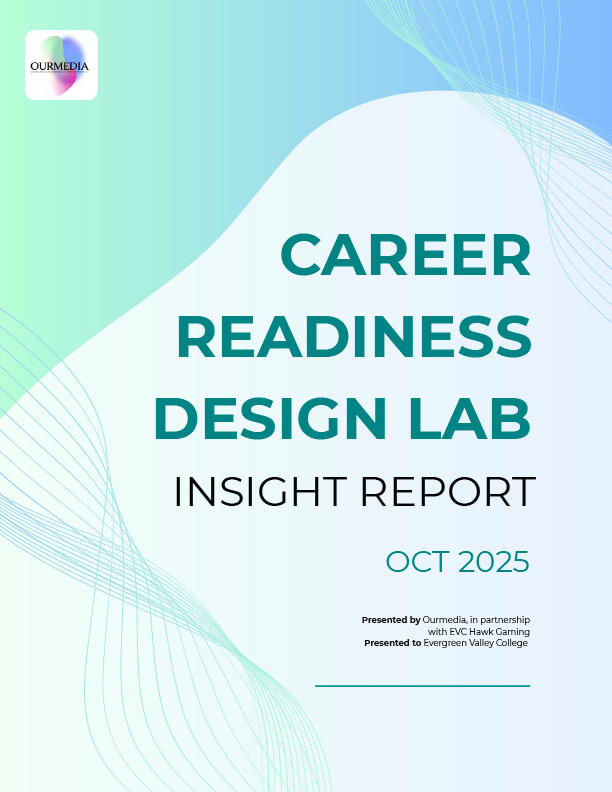Stop Teaching Networking as Performance. Start Treating It as Practice.
For many first-generation college students, “networking” sounds like a foreign language. They’re told to attend mixers, make elevator pitches, and “put themselves out there”– but no one ever explains what that actually means in practice. The result is that networking becomes a high-stakes performance instead of a skill that can be built, tested, and refined in safe, low-pressure spaces.
At Ourmedia’s Career Readiness Design Lab at Evergreen Valley College, that disconnect came up again and again. Students described traditional networking events as intimidating: rooms full of professionals in suits, expecting fluency in “professional speak.” One student admitted, “It can be hard to connect with people who feel so far ahead of you.” What we found, though, was that students were already doing networking — just not in the formal ways colleges typically recognize.
Networking Is Already Happening — Just Not Where We Think
When we looked closely, it became clear that students were already practicing the art of connection every day on campus.
Take Danny Vargas, a student leader who helped organize the Design Lab. He knew almost everyone on campus — students, faculty, staff — and could rally them quickly when we needed volunteers or space. His leadership in his club wasn’t just about planning events; it was a master class in building relationships, coordinating across departments, and learning how to ask for help and offer it in return.
Danny didn’t call that “networking.” But in practice, he was developing exactly the kind of social capital and communication fluency that career readiness programs aim to build.
Even the Design Lab itself became a networking environment. Students interviewed one another, co-designed prototypes, and shared contact information afterward. Several told us later they had started following each other on Instagram or connected to faculty mentors who joined the session. Without naming it, they were learning that networking isn’t about self-promotion — it’s about curiosity, reciprocity, and shared purpose.
The Learning Environment as a Networking Playground
One of the most striking observations came from a participant who said, “Our campus is the perfect place to start — we can connect with professors and staff first, and then work our way up to people outside.”
That’s exactly the mindset shift higher education needs. Too often, colleges treat networking as something that happens after the learning — a capstone skill once coursework is done. But what if we treated it as part of learning itself?
Imagine if courses, labs, and student clubs were explicitly designed to give students reps in relationship-building — reaching out, collaborating, asking good questions, reflecting on what went well. Networking would stop being a one-time hurdle and become a developmental process woven through their education.
That’s what students in the Design Lab intuitively understood: career readiness is not an outcome — it’s a journey. And like any muscle, the earlier and more consistently you use it, the stronger it gets.
Building a Culture Where Practice Is the Point
Ourmedia’s work across community colleges reinforces this pattern: when students are given structured chances to engage, reflect, and connect — rather than perform — they not only build confidence but also redefine what professionalism looks like for them.
The goal isn’t to replace the career fair. It’s to prepare students to walk into that room already knowing how to listen, share, and build trust — because they’ve been doing it in classrooms, clubs, and design labs all along.
Networking, in this sense, becomes a form of experiential learning — a practice that starts on campus and extends outward, growing more nuanced with every new connection. And when colleges cultivate that habit intentionally, they transform career readiness from something students fear into something they own.
The Invitation
If we want students to leave college prepared for the future of work, we need to stop measuring readiness by how well they perform in a room full of strangers. Instead, we should ask how well we’ve prepared them to connect with people they already know — to practice empathy, curiosity, and confidence where they learn every day.
That’s the real foundation of an equitable, human-centered approach to career development: giving every student, especially those who are first in their families to navigate these systems, the space and time to practice belonging before they’re asked to perform it.
Read more in our full report:


